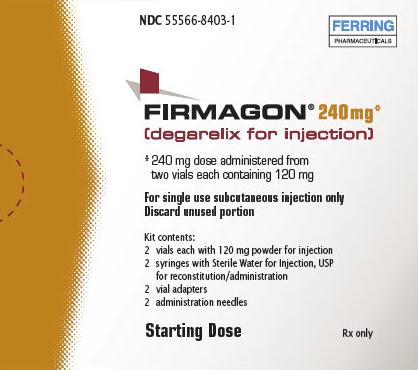Degarelix Disease Interactions
There are 3 disease interactions with degarelix.
Degarelix (applies to degarelix) hepatic impairment
Moderate Potential Hazard, Moderate plausibility. Applicable conditions: Liver Disease
Hepatic impairment can lower degarelix exposure. It is recommended to monitor testosterone concentrations on a monthly basis in patients with hepatic impairment until medical castration is achieved. Degarelix has not been studied in patients with severe hepatic impairment and caution is therefore warranted in this group of patients.
References
- (2013) "Product Information. Firmagon (degarelix)." Ferring Pharmaceuticals Inc
Degarelix (applies to degarelix) renal impairment
Moderate Potential Hazard, Moderate plausibility. Applicable conditions: Renal Dysfunction
Data on patients with moderate or severe renal impairment is limited and therefore degarelix should be used with caution in patients with CrCl < 50 mL/min.
References
- (2013) "Product Information. Firmagon (degarelix)." Ferring Pharmaceuticals Inc
GNRH antagonists (applies to degarelix) QT prolongation
Moderate Potential Hazard, Moderate plausibility. Applicable conditions: Long QT Syndrome, Congestive Heart Failure, Electrolyte Abnormalities
Androgen deprivation therapy may prolong the QT/QTc interval. Health care providers should consider if benefits of therapy outweigh the potential risks in patients with congenital long QT syndrome, congestive heart failure, electrolyte abnormalities, or taking other drugs that can also prolong the QT interval. Consider periodic monitoring of EKG and electrolytes.
References
- (2013) "Product Information. Firmagon (degarelix)." Ferring Pharmaceuticals Inc
- (2021) "Product Information. Orgovyx (relugolix)." Myovant Sciences, Inc.
Degarelix drug interactions
There are 232 drug interactions with degarelix.
More about degarelix
- degarelix consumer information
- Check interactions
- Compare alternatives
- Reviews (12)
- Side effects
- Dosage information
- During pregnancy
- Drug class: gonadotropin-releasing hormone antagonists
- En español
Related treatment guides
Drug Interaction Classification
| Highly clinically significant. Avoid combinations; the risk of the interaction outweighs the benefit. | |
| Moderately clinically significant. Usually avoid combinations; use it only under special circumstances. | |
| Minimally clinically significant. Minimize risk; assess risk and consider an alternative drug, take steps to circumvent the interaction risk and/or institute a monitoring plan. | |
| No interaction information available. |
Further information
Always consult your healthcare provider to ensure the information displayed on this page applies to your personal circumstances.


